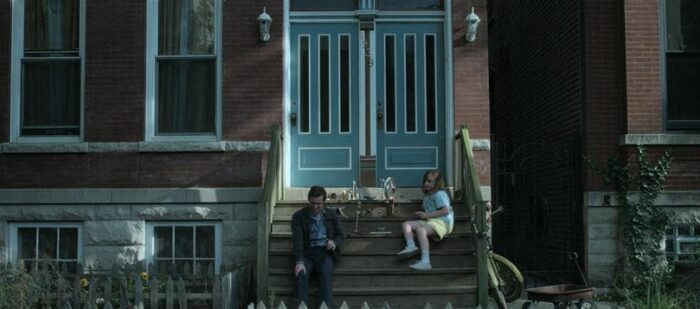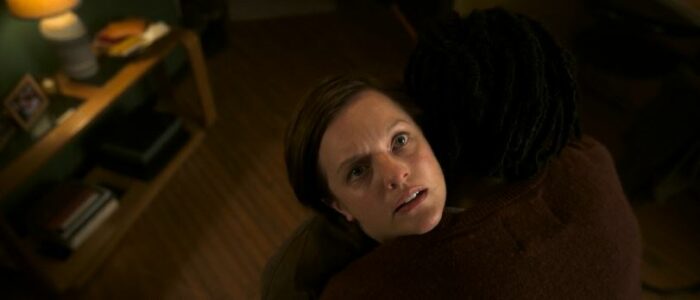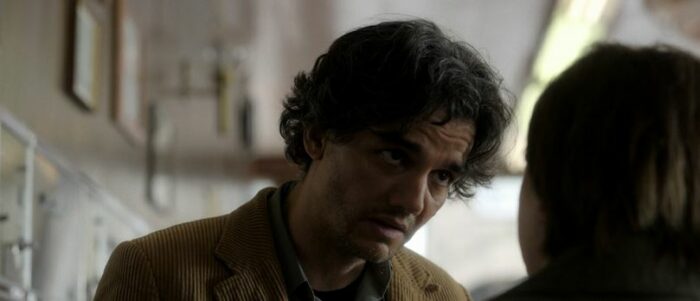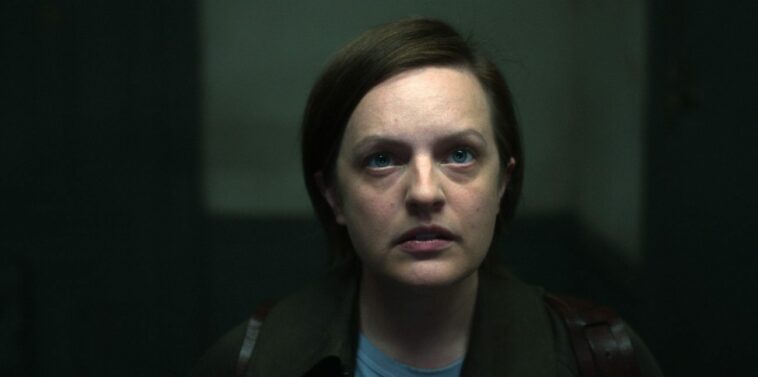The following contains spoilers for the three-episode premiere of Shining Girls on Apple TV+: S1E1, “Cutline” (written by Silka Luisa and directed by Michelle MacLaren); S1E2, “Evergreen” (written by Silka Luisa and directed by Michelle MacLaren); and S1E3, “Overnight” (written by Alan Page Arriaga and directed by Daina Reid)
From the beginning of its three-episode premiere, Shining Girls is defined by multiple mysteries at once. There is, of course, the serial killer mystery at the show’s heart, but it is not entirely clear to what extent this is even a mystery. Unless I’ve been fooled by televisual framing and conventions, and Shining Girls has tricks up its sleeves coming down the line, we know the killer from the very beginning. Indeed if this creepy man, who is credited as Harper (Jamie Bell), is not the killer somehow at the end of the day, I would not find this to be an exhilarating twist so much as kind of gross. That is, I’m not sure it would change my judgments of him all that much, as he’s clearly stalking women and messing with them. I’m not sure I could stomach any notion that he’s actually trying to do something to the good. Or even if he is, well, I’m feeling a bit of a Kantian on the matter here and judging him with regard to principles regardless of consequences.

The only reason I am even weighing such a possibility at all relates to the larger mystery in Shining Girls. Throughout S1E1 (“Cutline”) in particular, reality shifts around quite a bit. Kirby (Elisabeth Moss) has a cat named Grendel and then later it’s a dog named Grendel. She lives with her mother Rachel (Amy Brenneman) but returns home to find she lives with Marcus (Chris Chalk) and they’re married.
So it seems clear that there is something going on in Shining Girls with alternate realities or time travel (or both). It’s clear enough, in fact, that I am not sure how much mystery is here, though there is a question as to how it works and why. Mostly, however, the effect over the course of the first three episodes is to create confusion in the viewer. This may be to the point, to parallel the confusion experienced by Kirby, who has to keep a notebook to keep track of mundane facts about her life. But that notebook also changes.
Rather than being intriguing, Shining Girls risks making us feel so unmoored that it loses the stakes of the narrative. At the end of S1E1, when Kirby comes home to the wrong apartment, looks at her license, goes upstairs, and finds that she lives with Marcus, the scene is ripe with tension and the kind of fear that Shining Girls at its best clearly wants us to feel— anxiety about even the basic coordinates of reality.

This carries over at a lower pitch through S1E2 (“Evergreen”) but by the time we get to S1E3 (“Overnight”) it feels like this new reality has settled in and the temporal weirdness with regard to Dan (what night he went to the bar and got the cut on his wrist and so on) doesn’t feel terribly compelling. Particularly since we see Harper mess with Dan’s books—one starts to feel like he’s behind everything.
Indeed the “many worlds” aspect of the story in Shining Girls almost undermines the serial killer narrative at its core. It seems clear that it’s Harper doing the killing from what we’ve seen so far, and he has a way of knowing what’s going to happen before it does, so what hope is there of stopping him? How far-fetched is Shining Girls going to get with its metaphysics? It starts to feel like we’d need a time-traveling superhero to take on this villain, though I don’t think the show will go in that direction.
Thus I find myself wondering if somehow there will be a wrinkle in the explanation of Harper’s behavior, such that he’s actually trying to fix a tear in the fabric of spacetime or something like that. There is no justification for how he treats Jinny (Phillipa Soo), though, even if he didn’t kill her. Or maybe he killed her in one reality but not in others? Maybe he has to pare things down to restore the timeline?
I hope this story isn’t anything like that, but there is the question of why Kirby wasn’t killed when all of the other women she and Dan (Wagner Moura) have discovered were. This could have been a mistake, but given everything else going on in Shining Girls, I’m prone to wonder if there’s more to it than that.

The series is based on a novel, which I have not read, but I presume it likely has a thematic resonance with issues pertaining to trauma, which I can’t say I’m quite feeling in Shining Girls the TV show at this point, after watching the three episodes Apple TV+ decided to release at once to premiere it. Instead, things feel a bit murky and muddled.
I’m not asking for a straightforward plot and was indeed drawn to check out Shining Girls by the promised weirdness. But there is a difference between a compellingly strange narrative like one gets in a film like Inland Empire and an incoherent one. Something has to make the work hang together, even if it is more in the domain of effect than logic. At times it feels like that’s there in Shining Girls through its characters, but at others, I have felt there is so much in question that I cannot get my bearings to find any given question intriguing.
I hope this all takes shape as we move forward. I suppose we’ll have to keep watching to find out.


With a banquet of offerings from so many sources just a button-push away, our engagement expectation is honed to excellence. It is what we now come to expect from all new series.
Neither Michelle MacLaren or Elizabeth Moss are new at this; each has made such significant impact(s) individually within our ongoing “golden age of series-programming” such that, no matter how muddled/confusing the first three episodes have been (and they certainly are muddled/confusing), the MacLaren/Moss joint involvement necessitates an allowance for whatever it is they are up to, unfolding in its own time and terms.
I’m hoping Michelle and Elizabeth are giving us something similar to “Dark” rather than “Life On Mars (US version)”, but…time will tell.